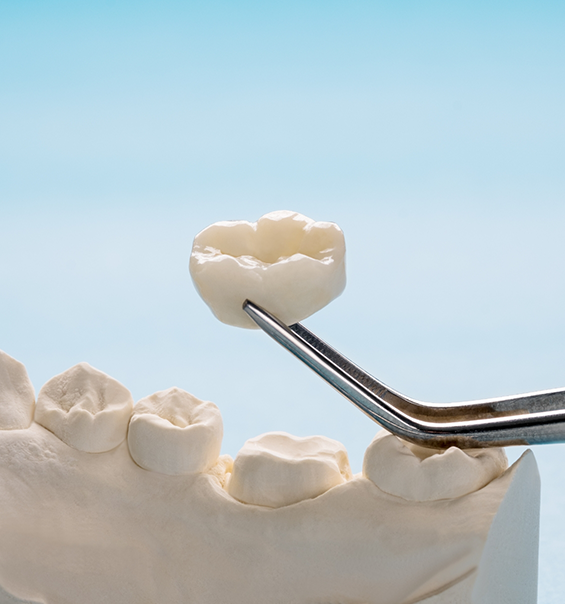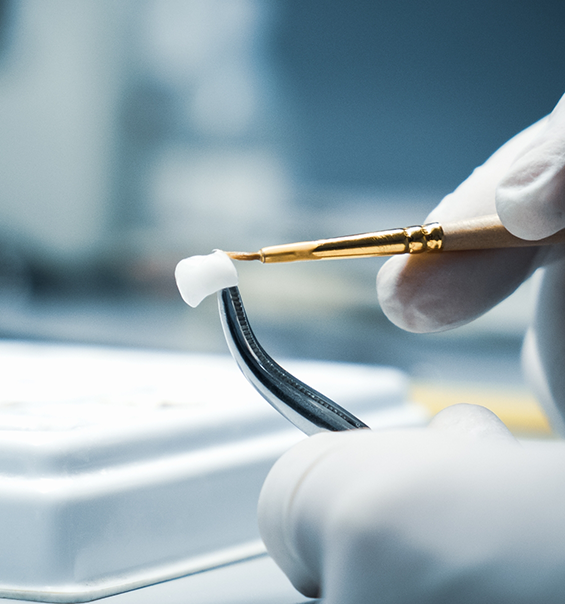Dental Crowns West Palm Beach
Repair & Rebuild Damaged Teeth
Your teeth can become damaged for a multitude of reasons – from untreated decay to a serious crack from biting into something extremely crunchy. The good news is that the look and function of your tooth won’t be compromised for long; we offer dental crowns! Dental crowns are one of the most popular options due to their versatility as well as the natural-looking results they produce. If you’d like to learn more about dental crowns in West Palm Beach, schedule an appointment with us at Palm Beach Dental Excellence or read on.
Why Choose Palm Beach Dental Excellence for Dental Crowns?
- Highly Trained Dentist
- Top-Rated Dental Office
- Advanced Dental Technology Used
What Is a Dental Crown?

A dental crown is commonly referred to as a “cap” because it simply fits over the top of a damaged natural tooth. Most often, this restorative dental treatment is used when a traditional filling is not adequate to fully repair a decayed tooth. However, it can also be used to enhance a tooth that has received root canal treatment. Additionally, dental crowns can anchor a dental bridge in place or be fitted on top of a dental implant to improve the look and function of your smile.
The Dental Crown Process

There are a variety of materials that can be used to fabricate dental crowns, and the exact material used is determined by the goal of your particular clinical treatment. The most common types of crowns Dr. Mihran Asinmaz uses are all-ceramic (no metal) and gold.
After deciding which type of crown to fabricate, we will solidify the details of your treatment plan and begin the process of restoring your tooth! After providing the treatment, we will shape the tooth and take the necessary impressions. While the lab artisans are working on your permanent crown, we will secure a temporary one in place. For the next few weeks, you should avoid chewing on that side of your mouth to help prevent it from becoming loose.
The last step is to return to our office to have your final crown placed. After removing your temporary one, we will cement your dental crown over the tooth and check your bite. If any minor adjustments are needed, we will make them at this point. Otherwise, the process is complete!
The Benefits of Getting a Dental Crown

Naturally, one of the biggest benefits is that dental crowns can seamlessly restore a damaged tooth, alleviating pain and improving your bite in the process. However, dental crowns also improve the aesthetic of your tooth since we use superb porcelain technology that allows us to fabricate crowns that appear like natural teeth. It’s also worth noting that dental crowns can last for more than a decade if you care for them properly.
If you would like to learn more about how dental crowns work, or if you are ready to have your damaged teeth repaired, please contact our dental office today.
A Message from Dr. Asinmaz
“Have you ever had a crown placed where you look at it and say, ““Hmmm, this doesn’t look like it belongs with the rest of my teeth.”” The new crown may appear too bulky, or the color doesn’t seem to match. I believe that even a small filling should completely blend in with the surrounding teeth!”
While more extensive cosmetic procedures typically get the majority of the “wow factor,” it is my philosophy that even less-involved cosmetic treatments can be both functionally and cosmetically excellent. For example, when replacing a single crown, the color, shape, and anatomy should match the teeth next to it for a seamless and natural-looking fit.”
Dental Crown FAQs
Are Dental Crowns Permanent?
Dental crowns aren’t permanent, but they are considered a long-term solution. On average, they can protect your teeth for anywhere between 5 to 25 years and up. When your dentist reshapes your tooth for a crown, that procedure is irreversible. Tooth enamel cannot grow back after it has been lost, so the tooth will always need a crown going forward. That being said, a crown protects the underlying tooth from additional damage, helping the tooth to survive for much longer than it likely would have otherwise.
Do Dental Crowns Get Cavities?
A crown can't develop cavities, but the tooth underneath it still can. A crowned tooth has about the same risk of decay as an uncrowned tooth. Poor oral hygiene makes it possible for bacteria and plaque to form around the gumline where the tooth meets the crown. They can then travel underneath the crown and wreak havoc on the underlying tooth. You can prevent cavities in crowned teeth the same way as you do for your other teeth. Brush, floss, and see your dentist for routine checkups.
Does It Hurt to Get a Dental Crown?
Just like when you get a filling, your dentist will numb the tooth they’ll be working on when you get a crown. After your tooth is prepared, it may feel sensitive for the next few days. This can be managed with over-the-counter pain relievers but give your dentist a call if the discomfort worsens. Since crowns protect vulnerable teeth from damage, they can help prevent further sensitivity going forward.
What Happens If You Wait Too Long to Get a Dental Crown?
Dentists will only recommend a dental crown if you truly need one. You might be tempted to put off the procedure, but it is best to schedule it right away after your dentist has made the suggestion. Waiting too long to get a crown will leave your compromised tooth exposed to chewing forces, food debris, and bacteria, ultimately causing the damage to worsen. Eventually, you could end up needing a root canal or extraction.
